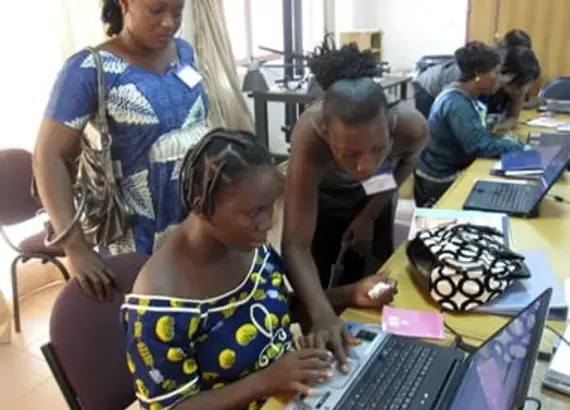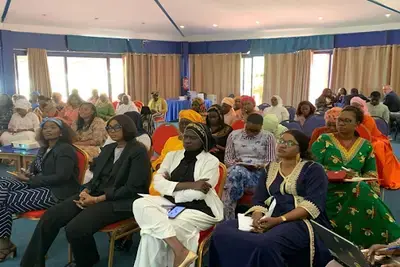
Success Story
Leadership Academy Prepares Young Women for Political Careers in Burkina Faso
Women who want to enter politics in Burkina Faso face a number of barriers, such as lack of faith in their leadership abilities, few role models and limited opportunities. So it is a struggle in this West African country for women to run for office, rise within party ranks or contribute to party platforms. Those who manage to win elections don’t receive the same level of political party support and training as men and, as a result, have a harder time being successful as office holders.
An encouraging step toward increasing the number of women in politics is a 2009 law requiring that 30 percent of candidates on party lists be female. Local and national elections next year present an opportunity for political parties to put this quota into practice, particularly if they place more women at the top of candidate lists. Currently, only 15 percent of members of parliament are women.
To help prepare women to run and move their priority issues onto party platforms, NDI organized the Young Women Political Party Activist Leadership Academy, a week-long political boot camp held in July for 50 young Burkinabe women from the five main political parties. The academy was funded by the Dutch Embassy in Burkina Faso.
Women attended sessions on communications, advocacy, conflict resolution and coalition building. But one of their primary concerns was to learn strategies for managing and balancing their time as mothers, employees and politicians. They sought information on how to successfully pursue a political career while caring and providing for their families. Trainers focused on ways to track time spent on each competing responsibility so they could meet their goals and still lead a balanced life.
Attendees also had the opportunity to meet with party leaders to discuss support for youth and women candidates and constituents, and better ways to carry out the quota law in upcoming elections.
Haoua Dia Thiam, president of the Senegalese Council of Women (Cosef) and a former member of parliament in Senegal, talked candidly about the challenges Cosef faced when bringing together women from all political parties and the benefits of uniting to work together as women. Barrie Freeman, then deputy regional director for NDI’s Central and West Africa programs, stressed that “building and sustaining strong, vibrant democracies depends on the robust participation of women in public life.” She encouraged the participants to “exchange ideas and develop their own individual strategies to climb the ladder of political success.”
Daily computer trainings and access to the academy’s computer lab helped women learn online networking tools, including email, Facebook and iKNOW Politics, an online network dedicated to the advancement of women in politics. Through iKNOW Politics, Burkinabe women can communicate with other women activists and leaders who use the site to exchange strategies, stories and advice. iKNOW Politics is a joint project of NDI, International IDEA, the Inter-Parliamentary Union, the United Nations Development Programme and UNWomen.
The academy concluded with teams developing initiatives to be carried out within their political parties in the coming months. The women outlined their goals, next steps and a timeline for increasing women’s visibility and power in Burkinabe politics. Each participant received a manual containing tools for young women activists to start taking immediate action in their parties.
NDI will continue to support the young women through coaching and mentoring as they carry out their initiatives. Projects include creating a multiparty young women’s coalition, training young women in political parties, and hosting an informational forum on the country’s quota law.
Related:
Published Aug. 29, 2011



